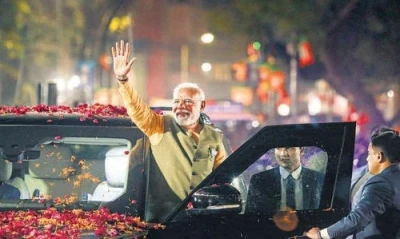Prime Minister Narendra Modi is charting an ambitious course for Bharat’s economic future, aiming to propel the nation into a leading global position if he secures a third consecutive term in office. Confident in his prospects for victory in the upcoming national election, PM Modi has unveiled plans to nearly double the size of Bharat’s economy and significantly boost exports over the next decade.
Reportedly, revealed through a government document, PM Modi’s economic vision put emphasis on growth as a cornerstone achievement of his administration. Speaking at election rallies, PM Modi has pledged to elevate Bharat from its current fifth position to become the world’s third-largest economy.
The document, dated October, outlines a target of expanding the economy to $6.69 trillion by 2030, up from the current $3.51 trillion. While specifics on implementation remain forthcoming, PM Modi has already directed officials to accelerate the development of strategies to achieve these goals by May.
When embarking on his second term five years ago, PM Modi pledged to propel the economy to a $5 trillion milestone by the current fiscal year. However, the unforeseen disruptions caused by the Covid pandemic made this target nearly unattainable.
Over the course of the next six years, PM Modi aims to elevate per capita income to $4,418 from its current standing of around $2,500. While the document outlines this objective, it refrains from detailing the specific fiscal allocations or policy reforms necessary to actualise such substantial growth.
Independent economist Saugata Bhattacharya has voiced skepticism, characterising the task of doubling the economy by the decade’s end as a formidable challenge. Achieving this goal, he suggests, would necessitate sustained growth rates averaging between 6 per cent and 6.5 per cent annually, alongside managing inflation at 4.5 per cent.
Despite these challenges, Bharat’s economic resilience has been evident, with the previous fiscal year witnessing approximately 8 per cent growth, outpacing many major economies globally. This robust performance has been underpinned by vigorous manufacturing and construction activities, buoyed by substantial government investments.
The document outlines the aspirations of PM Modi’s administration, aiming for a substantial surge in exports of goods and services to £1.18 trillion by 2030, up from approximately £520 billion. This ambitious goal could potentially double India’s export share in global trade to over 4 per cent.
Key to achieving these targets is plans to address 70 areas of improvement, with a particular emphasis on enhancing workforce skills and vocational training. Industry leaders have frequently voiced concerns regarding the skill levels of the labour force, prompting the government to prioritise initiatives in this area.
Additionally, there is a concerted effort to elevate the literacy rate to 82 per cent by 2030, up from the current level of around 78 per cent. The aim is to reduce unemployment to below 5 per cent from the current 8 per cent, while increasing the labour force participation rate to over 50 per cent from the current 46 per cent.
PM Modi has underscored the necessity of retaining power to enact measures aimed at propelling Bharat towards a developed economy by 2047, coinciding with the nation’s 100th year of Independence. However, specific details regarding these measures have not been elucidated.
Opinion polls indicate strong electoral prospects for PM Modi, with projections suggesting a significant victory in the elections commencing on April 19 and concluding after seven phases on June 1. Vote counting is scheduled for June 4.
A recent survey conducted suggests that a coalition led by PM Modi’s BJP could secure nearly three-fourths of parliamentary seats, marking a significant electoral triumph. Meanwhile, the Congress party is anticipated to face a potential historic low in its seat count.
If these projections hold true, PM Modi would achieve a remarkable milestone, becoming the first individual since Prime Minister Jawaharlal Nehru to secure three consecutive terms in office.

















